
ANALYTICAL AND BIOANALYTICAL CHEMISTRY
Scope & Guideline
Unveiling the Complexities of Chemical Analysis
Introduction
Aims and Scopes
- Analytical Techniques Development:
The journal prioritizes the advancement of analytical methodologies, including chromatography, mass spectrometry, electrochemical sensors, and spectroscopy, aimed at improving detection limits and analysis efficiency. - Bioanalytical Applications:
Research articles often explore bioanalytical applications, focusing on the analysis of biological samples to detect drugs, metabolites, and biomarkers for various diseases. - Environment and Food Safety:
There is a significant emphasis on analytical methods for detecting contaminants in food and environmental samples, reflecting the journal's commitment to public health and safety. - Nanotechnology in Analysis:
Innovative uses of nanomaterials in chemical sensing and biosensing are a recurring theme, showcasing the journal's role in integrating nanotechnology with analytical chemistry. - Interdisciplinary Approaches:
The journal encourages interdisciplinary research that combines analytical chemistry with fields like molecular biology, materials science, and pharmacology to address complex scientific challenges.
Trending and Emerging
- Integration of Machine Learning:
There is a noticeable increase in the use of machine learning algorithms for data analysis and interpretation in mass spectrometry and other analytical techniques, signaling a trend towards AI-assisted analytical methods. - Point-of-Care Testing:
Research focusing on portable and rapid diagnostic tools for point-of-care testing has surged, particularly in the context of infectious diseases like COVID-19, reflecting a growing demand for accessible health monitoring. - Sustainable Analytical Practices:
The adoption of green chemistry principles and sustainable practices in analytical methods is on the rise, with a focus on reducing environmental impact and enhancing the efficiency of chemical analyses. - Advanced Nanomaterials:
The application of advanced nanomaterials in sensor development and bioanalysis is increasingly prominent, showcasing innovative approaches to enhance sensitivity and selectivity in chemical detection. - Metabolomics and Proteomics:
Research in metabolomics and proteomics is gaining momentum, with a focus on understanding complex biological systems and disease mechanisms through comprehensive analysis of metabolites and proteins.
Declining or Waning
- Traditional Chromatography Methods:
There appears to be a waning interest in conventional chromatography methods as researchers increasingly adopt more advanced techniques like ultra-high-performance liquid chromatography (UHPLC) and microfluidic approaches. - Basic Spectroscopic Techniques:
The publication of studies focusing solely on traditional spectroscopic methods, such as UV-Vis or basic fluorescence without novel enhancements, has decreased as more sophisticated techniques gain traction. - General Reviews and Methodologies:
The journal has moved towards publishing more specific, application-driven studies rather than broad review articles, indicating a shift in focus towards practical implementations and case studies.
Similar Journals

JOURNAL OF ANALYTICAL CHEMISTRY
Catalyzing Progress in Analytical ChemistryJOURNAL OF ANALYTICAL CHEMISTRY, published by PLEIADES PUBLISHING INC, stands as a pivotal resource in the field of analytical chemistry, offering an innovative platform for researchers, professionals, and students to advance their knowledge and contribute to the discourse within the discipline. With an ISSN of 1061-9348 and an E-ISSN of 1608-3199, this journal features a focused exploration of analytical methodologies, instrumentation developments, and applications across various domains, contributing to practical and theoretical advancements in the field. Currently ranked in the Q3 category in Analytical Chemistry with a Scopus rank of #111 out of 156, it provides critical insights and innovation strategies for professionals aiming to enhance their analytical capabilities. Access to the journal is through standard subscription models, and it covers an extensive range of topics pertinent to the discipline from 1996 to 2024. Engage with the JOURNAL OF ANALYTICAL CHEMISTRY to be part of a vibrant research community dedicated to push the boundaries of analytical practices.
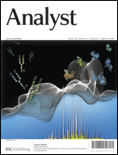
ANALYST
Illuminating Insights in Analytical and Environmental ChemistryANALYST, published by the Royal Society of Chemistry, stands as a prestigious journal in the fields of Analytical Chemistry, Biochemistry, Electrochemistry, Environmental Chemistry, and Spectroscopy. Esteemed for its rigorous peer-review process and influential contributions to the advancement of scientific knowledge, the journal has been a vital resource for researchers and professionals since its inception in 1876. With an impressive Scopus ranking that places it in the top quartile for several chemical disciplines, it specifically ranks #12 in Spectroscopy and #31 in Analytical Chemistry, reflecting its robustness and relevance in the analytical sciences. Though currently not an Open Access publication, ANALYST provides valuable insights and cutting-edge research that help drive innovation and discovery in various scientific realms. Researchers and students alike will benefit from its commitment to disseminating high-quality research that addresses contemporary challenges and promotes interdisciplinary collaboration.
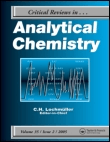
CRITICAL REVIEWS IN ANALYTICAL CHEMISTRY
Unveiling Breakthroughs in Analytical Methodologies.Critical Reviews in Analytical Chemistry, published by Taylor & Francis Inc, stands as a pivotal journal in the field of analytical chemistry, contributing significantly to its advancement since its inception in 1989. With an impressive Q1 ranking in the 2023 analytical chemistry category, it positions itself among the top 15 journals in the field, reflecting its high impact and relevance, as evidenced by a 90th percentile Scopus rank. This esteemed journal is dedicated to publishing comprehensive reviews that synthesize current research and emerging methods in analytical techniques, making it an invaluable resource for researchers, professionals, and students alike. With the goal of fostering innovation and collaboration, Critical Reviews in Analytical Chemistry continues to address challenges and breakthroughs within the sphere of analytical methodologies, ensuring its authors and readers remain at the forefront of scientific discovery.
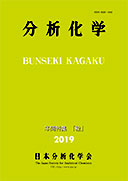
BUNSEKI KAGAKU
Connecting Researchers Through Quality ScholarshipBUNSEKI KAGAKU, published by the Japan Society Analytical Chemistry, is a reputable journal dedicated to the field of analytical chemistry. With an ISSN of 0525-1931, this journal has been a crucial outlet for scholarly communication since its inception in 1952, converging its publication years from 1954 to 1957 and from 1959 to 2024. Although it holds a Q4 category ranking in the most recent 2023 quartiles of analytical chemistry and ranks 153/156 in Scopus, it continues to serve as a platform for quality research, fostering advancements in the field. BUNSEKI KAGAKU is based in Tokyo, Japan, and emphasizes the critical importance of analytical techniques in scientific inquiry. With a commitment to professionalism and rigor, the journal provides a vital resource for researchers, students, and professionals seeking to explore innovative methodologies and contribute to the ongoing dialogue in analytical chemistry.
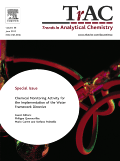
TRAC-TRENDS IN ANALYTICAL CHEMISTRY
Diving Deep into the Latest Methodologies and TechnologiesTRAC - Trends in Analytical Chemistry is a prestigious journal published by Elsevier Science Ltd, situated in the Netherlands. With an impressive impact factor reflected in its Q1 rankings across three major categories—Analytical Chemistry, Environmental Chemistry, and Spectroscopy—this journal stands at the forefront of disseminating pioneering research and advancements in the field of analytical chemistry. Established in 1981, TRAC provides a comprehensive platform for researchers to share influential studies and insights related to the latest trends, methodologies, and technologies in analytical techniques. Recognized globally, the journal excels in fostering cross-disciplinary dialogue and innovation, making it an indispensable resource for academics, professionals, and students alike. Explore the latest issues to stay abreast of cutting-edge developments that shape the analytical sciences.
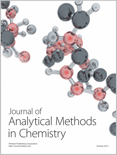
Journal of Analytical Methods in Chemistry
Exploring the frontiers of chemistry through rigorous research.The Journal of Analytical Methods in Chemistry, published by HINDAWI LTD, stands as a premier platform dedicated to the dissemination of research in the vibrant field of analytical chemistry. With an ISSN of 2090-8865 and an E-ISSN of 2090-8873, this Open Access journal has been committed to providing unrestricted access to quality research since 1978, thereby fostering greater collaboration and innovation among researchers, professionals, and students globally. The journal showcases rigorous research insights spanning diverse categories, earning impressive Scopus rankings including Q2 in Chemical Engineering and Q3 in Analytical Chemistry for 2023, positioning itself effectively among respected peers. Its interdisciplinary approach also covers significant contributions in the realms of instrumentation and computer science applications, thus addressing contemporary challenges and advancements in analytical methodologies. By bridging theoretical underpinnings with practical applications, the Journal of Analytical Methods in Chemistry aims to catalyze knowledge exchange while enhancing the global discourse in analytical science.

BMC Chemistry
Fostering Global Collaboration in Chemical ResearchBMC Chemistry, published by BMC, is a reputable open access journal that has made significant strides since its inception in 2019. Operating under e-ISSN 2661-801X, this journal is dedicated to advancing the field of general chemistry by promoting high-quality research across various sub-disciplines. Headquartered in the United Kingdom, BMC Chemistry boasts a commendable impact factor and is classified in Q2 within the prestigious field of Chemistry (miscellaneous) according to the 2023 category quartiles. The journal's Scopus ranking places it at #139 out of 408 in its category, highlighting its growing relevance and influence in the academic community, with a commendable 66th percentile standing. With a commitment to open access, BMC Chemistry ensures that groundbreaking discoveries and innovative research are available to a global audience, fostering collaboration and development in chemistry. Researchers, professionals, and students alike will find this journal to be an invaluable resource for disseminating knowledge and driving scientific advancement.

Brazilian Journal of Analytical Chemistry
Catalyzing Collaboration in Analytical ChemistryBrazilian Journal of Analytical Chemistry, published by VISAO FOKKA COMMUNICATION AGENCY, serves as a vital platform for those engaged in the field of analytical chemistry, especially within the Latin American context. With an ISSN of 2179-3425 and an E-ISSN of 2179-3433, this journal aims to promote high-quality research and advancements in analytical methodologies, instrumentation, and applications spanning from 2010 to the present. Although it currently holds a Q4 rank in Analytical Chemistry by Scopus and is placed at the 24th percentile, its commitment to open access publishing provides invaluable opportunities for widespread dissemination of knowledge, catering to researchers, professionals, and students alike. The journal's editorial board comprises emerging and established experts aiming to bridge gaps in analytical chemistry research, particularly in a Brazilian and broader South American context. Situated in São Paulo, Brazil, the journal's role in fostering innovation and collaboration in analytical techniques makes it an essential resource for the academic community.

CHEMICAL RESEARCH IN CHINESE UNIVERSITIES
Fostering Excellence in Chemistry and EducationCHEMICAL RESEARCH IN CHINESE UNIVERSITIES is a prominent academic journal dedicated to the dissemination of high-quality research in the field of chemistry and related educational methodologies. Published by HIGHER EDUCATION PRESS, this journal has established itself as a vital resource for researchers and professionals looking to stay at the forefront of chemical sciences. With an impressive impact factor and ranked in the Q2 quartile for both Chemistry and Education categories, it highlights significant advancements while maintaining rigorous peer-review standards. The journal's ISSN is 1005-9040 and its E-ISSN is 2210-3171, ensuring broad accessibility to its global readership. Although it does not offer open access, its contributions are vital to understanding the dynamics of chemistry research and education within and beyond China. With converged publication years from 1999 through to 2024, CHEMICAL RESEARCH IN CHINESE UNIVERSITIES continues to be an essential platform for innovative studies and critical discussions in the expanding realm of chemistry.

Journal of Analysis and Testing
Elevating standards in analytical and environmental science.Journal of Analysis and Testing is a premier academic journal published by SPRINGER SINGAPORE PTE LTD, dedicated to advancing the fields of analytical and environmental chemistry. With ISSN 2096-241X and E-ISSN 2509-4696, the journal has established a significant presence since its inception in 2017, converging its focus until 2024. The journal's outstanding rankings in 2023, including Q1 quartile placements in Analytical Chemistry, Instrumentation, and Spectroscopy, underscore its pivotal role in disseminating high-quality research. Researchers can access cutting-edge studies that explore innovative testing methodologies, electrochemical analyses, and material evaluations, making it an essential resource for professionals and students alike. The Journal of Analysis and Testing not only celebrates advances in science and technology but also promotes interdisciplinary collaborations, ensuring widespread impact across analytical and environmental domains. As such, this journal plays a vital role in shaping the future of analytical practices and methodologies, positioning itself as a key conduit for knowledge exchange in the scholarly community.